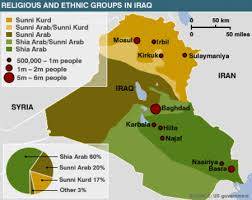 While the Islamic State of Iraq and Syria (ISIS) movement is gaining ground in Iraq and is spreading its violence the world is still pondering what to do about it. While the world is only discussing, ISIS is using the time to get stronger. And: all solutions discussed so far will not solve the situation. They have all in common that they would push the country further into a civil war, with the potential to turn it into into a regional conflict.
While the Islamic State of Iraq and Syria (ISIS) movement is gaining ground in Iraq and is spreading its violence the world is still pondering what to do about it. While the world is only discussing, ISIS is using the time to get stronger. And: all solutions discussed so far will not solve the situation. They have all in common that they would push the country further into a civil war, with the potential to turn it into into a regional conflict.
Currently ISIS controls parts of East Syria and the North-West of Iraq, quickly advancing towards the South of Iraq. Its troops have been kept out the North-East by the well-organized Kurds controlling that part of Iraq with their own regional government.
Background ISIS
ISIS was founded in 2004 as chapter of Al-Qaida. For a long time it was rather dormant – until the civil war in Syria opened opportunities. After it became clear that there will be no substantial support for the anti-Assad movement by foreign countries the support for radical Islamic movements was growing among the population. Al-Qaida and ISIS seized this chance in 2013, first as part of the rebel forces. But soon it came to a break between ISIS and other rebel groups as ISIS operated too radical and the cruelties from ISIS against the local population were not the way other groups wanted to act. In early 2014 it came also to a split between Al-Qaida and ISIS due to different views on the strategy in Syria. Since then ISIS has been operating on itself. Led by a former Iraqi, ISIS aims for rebuilding the second Caliphate in (parts of) Iraq and Syria.
There are basically three "solutions" that are discussed so far: use of drones and airstrikes to weaken ISIS, use of ground troops and support of the Iraqi government, potentially together with Iran. The first two options are more or less ruled out, rightly. Drones and airstrikes might weaken ISIS for the time being – but they will also cause civil casualties. That would only lead to more support for ISIS and not less. Furthermore that ISIS will only be weakend by those strikes but not defeated. It will come back stronger after a while.
Troops might be more effective against ISIS, but this will also only increase support for ISIS as foreigners are not welcomed in this conflict. And in the long run ISIS will come back - latest after the troops leave.
The third option discussed, supporting the government of Nouri al-Maliki, sounds like the most logical thing to do. But it ignores the fact that his current government is sectarian pro-Shiite and not accepted in the Sunnite parts of Iraq. Over the last years he has alienated himself from the Sunnites and has favoured Shiites (while more and more oppressing Sunnites). Supporting his government will only be another step towards a full fletched civil war.
Iraq has three main groups: Sunnites, Shiites and Kurds. ISIS is greatly supported by the Sunnites. Sunnites used to rule Iraq (Saddam Hussein was Sunnite). After the hand-over and elections there has been first a cooperation between Sunnites and Shiites - forced by the U.S., but president Nouri al-Maliki, Shiite himself, came later back on this. Currently he is running a sectarian government, favouring Shiites and oppressing Sunnites. To many Sunnites ISIS looks like a better alternative to the current situation and to the perspective they have under the current regime. Order is created, a functioning state – and they are not anymore oppressed based on their faith.
So supporting the government of al-Maliki will change nothing with regard to the support ISIS has among Sunnites, especially as al-Maliki still refuses to talk to Sunnite leaders.
Supporting al-Maliki together with Iran would make things only more complicated – as today’s news showed. Only minutes after the president of Iran, Hassan Rohani, announced that Iran will do everything needed to protect sacred religious sites in Iraq, including sending troops as ultima ratio, Saudi-Arabia foreign minister Saud Bin Faisal Al Saud rejected all external involvement in Iraq. Saudi-Arabia is largely Sunnite. Iran openly supporting al-Maliki will only draw Saudi-Arabia into the conflict.
The region is like a volcano - ready to explode any minute. External involvement is a recipe to make it explode. The only way to solve this can be using diplomatic means to find a compromise involving all parties, except ISIS.
The only real option seems to be something that should have been implemented already long before: making Iraq a federal state. Giving the Sunnites their own regional government and autonomy from the central government could persuade them to back the central government and to turn against ISIS. It is about time that this option comes on the table – before the conflict turns into a regional war. So get all parties needed on the table, use Iran to push al-Maliki and get Saudi-Arabia to push the Sunnites. Hopefully there is still enough time!